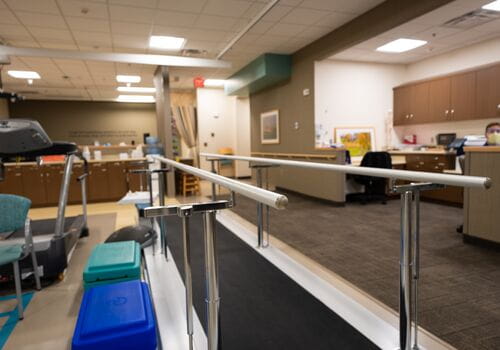
Palliative care: cancer treatment support for patients
Palliative care is a specialized field of medicine that treats patients who have a serious illness. It serves to augment, but not replace, patient treatments from other medical professionals.
Oncology research shows that with palliative care and good symptom management, some patients survive longer and have a better quality of life as they undergo cancer treatment.
At Allina Health Cancer Institute (AHCI), we work exclusively with adult patients who have cancer. Our Minnesota network has palliative care practitioners at our Abbott Northwestern Hospital, Mercy Hospital and United Hospital clinics. We partner with oncologists to help improve patients’ comfort throughout their course of treatment.
How AHCI’s palliative care supports oncology treatment
AHCI’s palliative care providers support the work of our referring oncologists, whether they are medical, surgical or radiation specialists. While the oncologists focus on eliminating or reducing cancer cells, we concentrate on managing the negative symptoms that may arise from the disease or its treatment. These symptoms include:
- Pain
- Chemotherapy-related nausea
- Appetite loss
- Depression
- Anxiety
- Fatigue
When should someone be offered palliative care?
Adults who are having any type of cancer treatment are candidates for AHCI’s palliative care program. This added support may be especially useful for people who:
- Have terminal or life-limiting cancer
- Are experiencing significant physical or emotional symptoms from cancer or from their cancer treatment
- Will likely have significant future symptoms from their cancer treatment
AHCI’s palliative care services

AHCI’s palliative care providers emphasize issues that affect a patient’s quality of life and well-being. We ask patients how they feel, how they are coping, what their needs are and what kind of support systems they have.
We build extra time into our visits so that we can explore the patient’s goals for their treatment. Our social workers also can help patients complete important advanced care planning paperwork.
We help patients stay as active as possible so they can enjoy their day-to-day lives. AHCI has a range of services that we have tailored for oncology patients. We can provide access to:
- Cancer rehabilitation: We offer physical, occupational and speech therapies at our Courage Kenny Cancer Rehabilitation Institute locations. These physical medicine therapies can help patients regain functions like walking and eating. Our specialized therapists also treat cancer complications like lymphedema.
- Integrative medicine support: Our Penny George Institute for Health and Healing provides integrative oncology therapies. We offer massage, aromatherapy, nutrition counseling, acupuncture and guided imagery, among many other services.
- Medical cannabis certification: All our palliative care clinics can certify medical cannabis to help patients manage symptoms such as chemo-related nausea or loss of appetite.
Multiple Options for Patient Visits
We have multiple ways to meet with patients. If the patient is able, we prefer to meet them, along with their loved ones, in person for our first visit. We have various options for follow-up appointments. Our virtual visits can reduce the burden of physical visits, especially for people who live in rural areas. Visit options include:
- In-person at our palliative care clinic locations
- Virtual by video or phone
- At home, if their insurance covers community palliative care visits
- In the hospital, through our Allina inpatient palliative care consultation teams
Expected Timeframes for Consultations and Continued Visits
We usually complete urgent palliative care consults within a couple of weeks after referral.
How often we see patients after their initial consult depends upon their individual situation and clinical status. The typical frequency of palliative care visits is:
- Patients with intense pain or other symptoms: every 1 to 2 weeks
- Patients in stable condition but with complex symptoms: every 1 to 2 months
- Patients in very stable condition: every 4 to 6 months
Palliative Care Versus Hospice
Hospice is a type of palliative care. Some patients choose hospice if they stop responding to cancer treatments or if they decide to discontinue treatment. Patients who qualify for hospice have a limited life expectancy of six months or less after they stop treatment.
In contrast, most palliative care patients are also receiving cancer treatment at the same time. Some patients complete their cancer treatment yet have ongoing symptoms, and we continue to help manage those symptoms. In AHCI’s palliative care program, we sometimes see people for years to actively assist them.
How to Refer a Patient for an AHCI Palliative Care Evaluation
When you refer a patient to AHCI for a for palliative care evaluation, one of our team members will review the information. That professional then decides whether it is best to see the patient at a clinic, in the community or both.
Referrals from within Allina Health can be sent through Epic, our electronic medical records system.
Providers from outside Allina Health can refer patients by calling our nearest cancer center:
- AHCI Buffalo: 763-684-7747
- AHCI Cambridge: 763-688-8700
- AHCI Coon Rapids: 763-236-0808
- AHCI Faribault: 507-497-3721
- AHCI Hastings: 651-404-1515
- AHCI Minneapolis: 612-863-0200
- AHCI New Ulm: 507-217-5562
- AHCI River Falls: 715-307-6430
- AHCI St. Paul: 651-241-5111